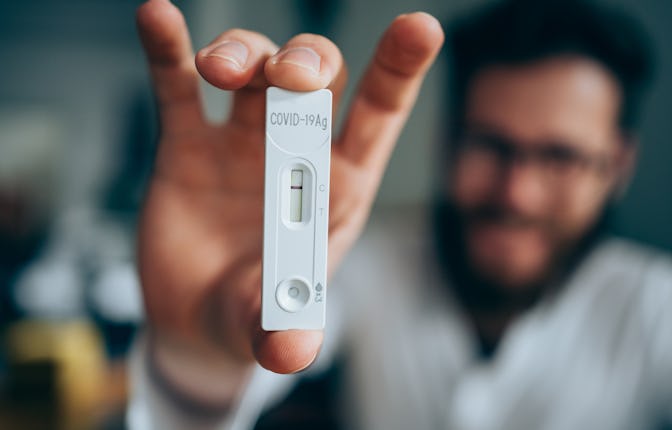How have some lucky bastards completely dodged COVID?
A look into the so-called "never COVID" demographic.

I have been exposed to COVID at least three times that I know of, but I’ve never tested positive myself. On average, I would say that I am on the somewhat paranoid side of the COVID awareness spectrum and I get freaked out every time I have a close encounter. But it keeps missing me and I keep wondering why. Now scientists are trying to figure out why some people seem more resistant to catching COVID, too.
It’s important to note that, at this point, scientists don’t actually know for sure what makes some people less likely to catch COVID when they’re exposed — but they are on to some crucial clues. In one small study, which is under consideration for publication in Nature Portfolio Journal pending peer review, 34 people were exposed to COVID. Almost half of the participants — 16 — never developed an infection. In case you’re wondering, for the purposes of this research, an infection was defined as two consecutive positive PCR tests.
Half of the 16 people who weren’t infected did test positive for having low levels of the virus in their systems, but never got fully sick. They had some mild symptoms, like headaches and fatigue, but they weren’t severe enough for researchers to determine that they were actual COVID symptoms and not just coincidental allergies or something, reported the Guardian. So, what’s up with these magical people who were purposefully exposed to COVID and still didn’t catch it?
“These findings imply that there is a struggle between the virus and host, which in our ‘uninfected’ participants results in prevention of infection taking off,” Christopher Chiu, a professor of infectious disease at Imperial College London and lead author on the study, told the Guardian. “In our previous studies with other viruses, we have seen early immune responses in the nose that are associated with resisting infection.” In other words, some people’s immune systems may be effectively fighting off the virus before it can fully develop.
The findings of this small study are consistent with other recent research that looked at healthcare workers who were regularly exposed to COVID but never got sick. One theory is that some people have an immune memory from previous coronavirus infections — like the common cold — that helps their body remember how to fend off COVID-19. In one study, 15% of people who were exposed but tested negative for COVID had T cells that were reactive against the virus. For those of us who aren’t genetic biologists, the presence of those T cells means that those people had definitely been exposed to COVID and their immune system had mounted an effective defense.
Some scientists think that some people may be genetically resistant to COVID-19 and are on a global hunt to find those people and figure out what makes them different. This quest to figure out what makes some people resistant to COVID isn’t just a scientific lark — the hope is that knowing what makes some people immune can help scientists make better vaccines for everyone. And this kind of resistance is known to exist against other diseases, like HIV and malaria.
Scientists think that some people may lack a receptor that the coronavirus uses to enter cells. This is considered a genetic defect — because it means someone is missing a receptor that most humans have — but in this case, it’s an advantage. “It could well be that, in some individuals, there is such a defect in a receptor used by Sars-CoV-2,” András Spaan, a professor of infectious disease at the Rockefeller University in New York who is leading the hunt for folks immune to COVID, told the Guardian.
But, if you’re like me and you haven’t caught COVID yet, don’t get too cocky. Scientists think it’s unbelievably rare for someone to be fully immune to the virus. “We are not looking for common gene variants that provide modest protection against infection. What we are looking for is potentially very rare gene variants that completely protect someone against infection,” Spaan told the Guardian. But until scientists discover that holy grail — if it’s out there — we all still need to stay vigilant.